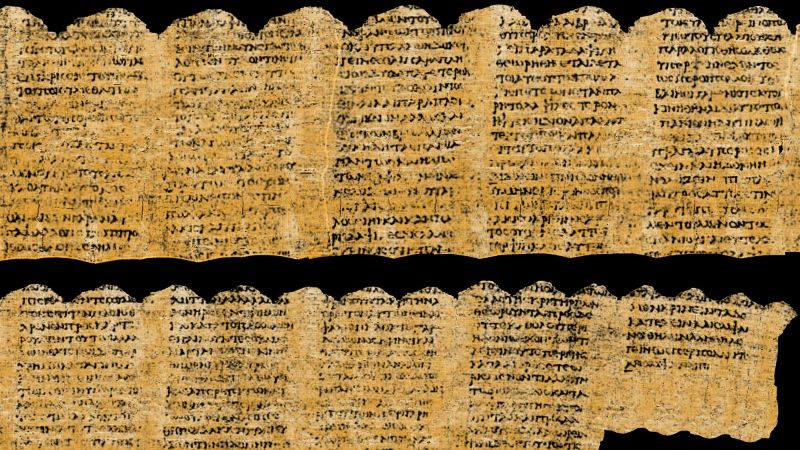
Exploring Ancient Philosophy Through AI: Deciphering the Herculaneum Scrolls

Delve into the fascinating world of ancient philosophy as AI uncovers hidden passages from the 2,000-year-old Herculaneum scrolls, shedding light on the thoughts of a renowned philosopher of the past.
AI Reveals Insights from Ancient Texts
In a remarkable feat of technological innovation, artificial intelligence has unlocked the mysteries of the Herculaneum scrolls, offering a rare glimpse into the profound musings of a philosopher from antiquity. These scrolls, preserved through the ages by the eruption of Mount Vesuvius in AD 79, have long remained inaccessible due to their fragile state, but modern computer technology has now made it possible to decipher their contents without risking damage.
A total of 15 passages were deciphered from the unrolled scroll. The first word to be decoded, the Greek word for purple, was detected in October 2023 and can be found within the newly interpreted passages.
Led by a team of dedicated researchers and computer scientists, the groundbreaking Vesuvius Challenge has yielded unprecedented results, with over 2,000 characters and 15 passages successfully decoded from the ancient scroll. The first word to be revealed, the Greek term for 'purple,' marked a significant milestone in the ongoing quest to unravel the wisdom enshrined within these enigmatic texts.
Unveiling Ancient Philosophical Discourses
The newly deciphered passages offer a window into the intellectual discourse of the past, showcasing a nuanced dialogue on topics such as pleasure and abundance. At the heart of these ancient writings lies the voice of Philodemus, a revered philosopher-in-residence whose insights continue to resonate across the centuries. Through his reflections on the nature of pleasure and the pursuit of happiness, Philodemus invites readers to contemplate timeless truths that transcend the boundaries of time and space.
The meticulous efforts of the research team, coupled with the cutting-edge technique of 'virtual unwrapping,' have brought to light 15 partial columns of text, each fragment adding to the tapestry of philosophical wisdom woven by the ancient thinker. As scholars delve deeper into these revelations, a renewed appreciation for the intellectual richness of antiquity emerges, paving the way for a deeper understanding of the human quest for knowledge and meaning.
Towards a Deeper Understanding of the Past
The discovery of the Herculaneum scrolls not only enriches our knowledge of ancient philosophy but also sheds light on the cultural and historical context of the time. As researchers continue to decode these precious texts, new insights into the intellectual landscape of the ancient world come to the forefront, offering a rare glimpse into the minds of thinkers who shaped the course of history.
The unique preservation of the tree, Sanfordiacaulis densifolia, where the trunk is surrounded by more than 250 spirally arranged leaves, was the result of earthquakes in a 352-million-year-old rift-lake system, now exposed in New Brunswick, Canada.
With each passage deciphered and each word revealed, the legacy of the philosopher Philodemus is brought to life once more, inspiring a new generation of scholars to delve into the depths of ancient wisdom. The ongoing quest to unlock the secrets of the Herculaneum scrolls stands as a testament to the enduring power of human curiosity and the boundless potential of technology in unraveling the mysteries of the past.









